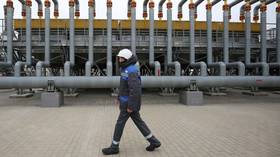Oil prices see biggest January loss in 30 years
Crude oil prices slid a painful 15% in January - the biggest January slide since 1991- as the coronavirus claims the death of more than 200 souls and counting.
After a couple weeks of continued slippage, the price of the Brent and WTI benchmarks were trading down 0.98 percent and 0.73 percent on the day, respectively, at 9:51am as the World Health Organization declared a global health emergency.
Also on rt.com Feast in time of plague? Trump official says China coronavirus is good for US economyWhile the WHO did not recommend any travel restrictions to China, the US State Department recommended no travel to China, and airlines have stopped flying to China, including Air France, British Airways, Lufthansa, Virgin Atlantic, Lion Air, and Seoul Air. Other airlines had reduced their flight schedules to China, including American, Delta, United, Finnair, Cathay Pacific, and Jetstar Asia.
In addition to airline stoppages, the Philippines halted visas on arrival to Chinese nationals, Hong Kong has stopped trains from China, Singapore has closed its borders to Chinese guests, Russia has closed its border with China - for people at least, Italy has halted all air traffic to and from China, Kazakhstan has halted bus service and passenger trains to China, North Korea has closed its borders to all foreign tourists - and these are just some of the travel restrictions in place, indicating that the world is proceeding with an abundance of caution despite the WHO stance that travel and trade should continue as usual.
It is these travel restrictions that are, in part, denting fuel demand, and OPEC is standing up and taking notice, and is considering moving up its March meeting in order to discuss how to respond to the viral emergency.
Brent was trading at $58.24 a barrel on the London-based ICE Futures Europe exchange on Friday, and is down around 12 percent in January, according to Bloomberg.
This article was originally published on Oilprice.com













